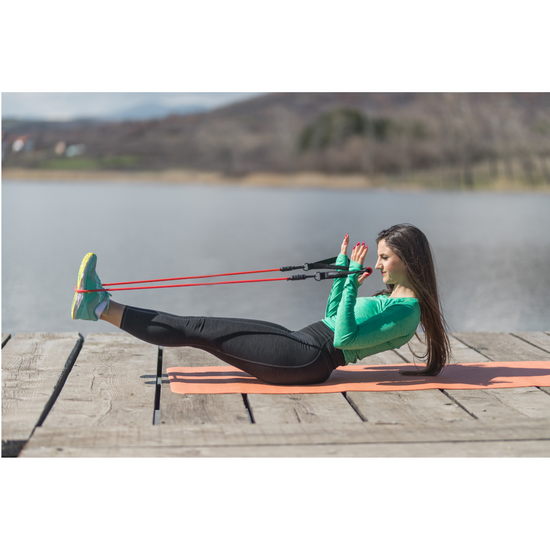In this article you'll get a detailed all-round look at the topic of regeneration.
No matter what your goal is in sport: Your success depends not only on training, but also on training breaks. In weight training they say: "The muscle grows in the rest phase". This rule applies to all sports training, regardless of the type of sport you do. In order to allow the body an optimal resting phase and thus to be able to develop further, the right regeneration after sport is important.
Here you will find some regeneration measures:
Sleep is one of the most important components of regeneration. Only during sleep do our brains and bodies really recover. In addition, the body can better repair existing damage, such as sore muscles, and thus prepare us for the next stresses.
That's why it's so important that you get enough sleep and feel rested.
To get the most out of your sleep, you can consider the following tips:
- Stop using screens 2 hours before sleeping
- Natural light is best for waking up - you can use a light alarm clock for this.
- Meditation/reading can provide relaxation before sleep
- Try to bring your room temperature to about 18-20 degrees, because that's when we sleep best.
- Stress has a negative effect on the quality of your sleep - try to reduce your stress as much as possible.
Another way to increase your regeneration is to take a sauna. This is relaxing and calming for most people. You recover better when you are well - so the sauna has its justification for regeneration.
The complete opposite is ice bathing. Nowadays, this is mainly used in professional sports and has been proven to have a positive effect on regeneration. The muscles recover much faster. However, you have to expose yourself to the cold for at least 10 minutes to achieve a measurable effect.
Another way to speed up your recovery is through your diet. What and in what quantity you feed your body has a significant effect on your body's recovery. Above all, you can promote your regeneration with protein-rich foods and antioxidants, which are mainly contained in berries.
Fascia training can reduce your muscle pain caused by training. It supports your regeneration. The fascia roller and the fascia ball are popular tools for this.
The last point is about regeneration after an injury. Because here, too, there are different opinions. For a long time, staying still after an injury was considered the best remedy. In the meantime, this attitude has become outdated. It is not only for professional athletes that light exercise is important after injuries. The supply of nutrients necessary for healing only functions smoothly if the affected part of the body is moved. In this context, it is even better for regeneration to work lightly in the area of pain instead of just switching to pain-free movement.
_______________________________________________________________
In this article you will get a detailed all-round look at the topic of regeneration.
No matter what your goal is in sport: Your success depends not only on training, but also on rest days. In weight training they say: "The muscle grows in the rest phase". This rule applies to all sports regardless of the type of sport you do. In order to allow the body an optimal resting phase and thus to be able to develop further, the right regeneration after sport is important.
Here you will find some regeneration tips:
Sleep is one of the most important components of regeneration. Only during sleep our brains and bodies do really recover. In addition, the body can better repair existing damage such as sore muscles and thus prepare us for the next stresses.
That's why it is so important that you get enough sleep and feel well-rested. To get the most out of your sleep you can consider the following tips:
- Stop using screens 2 hours before sleep
- Natural light is best for waking up - you can use a light alarm clock for this
- Meditation/reading can help you relax before sleeping
- Try to keep your room temperature at around 18-20 degrees, as this is where we sleep best
- Stress has a negative effect on the quality of your sleep - try to reduce your stress as much as possible
Another way to increase your regeneration is to take a sauna. This is relaxing and calming for most people. You recover better when you are well - so the sauna has its justification for regeneration.
The complete opposite is ice bathing. Nowadays, this is mainly used in professional sports and has been proven to have a positive effect on regeneration. The muscles recover much faster. However, you have to expose yourself to the cold water for at least 10 minutes to achieve a measurable effect.
Another way to speed up your regeneration is through your diet. What you and how much you eat has a significant effect on your body's recovery. Especially with protein-rich foods and antioxidants which are mainly contained in berries you can promote your regeneration.
Fascia training can reduce muscle pain caused by training. This supports your regeneration. The fascia roller and the fascia ball are popular tools for this.
The last point is for regeneration after an injury. Here too, there are different opinions. For a long time, staying still after an injury was considered the best remedy. In the meantime, this attitude has become outdated. It is not only for professional athletes that light exercise is important after injuries. The supply of nutrients necessary for healing only functions smoothly if the affected part of the body is moved. In this context, it is even better for regeneration to work lightly in the area of pain instead of just switching to pain-free movement.









